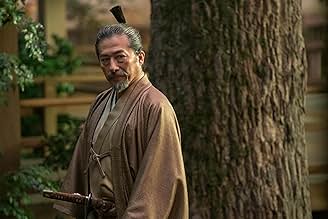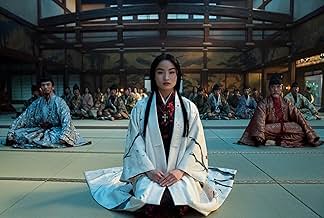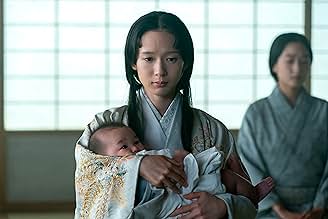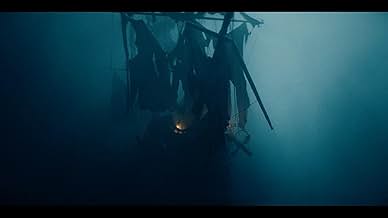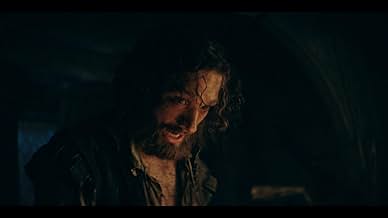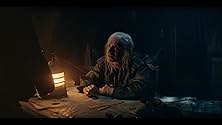Destinies converge in Japan after a barbarian ship washes ashore in a poor fishing village. Meanwhile, in Osaka, Lord Toranaga finds himself outplayed by his enemies.Destinies converge in Japan after a barbarian ship washes ashore in a poor fishing village. Meanwhile, in Osaka, Lord Toranaga finds himself outplayed by his enemies.Destinies converge in Japan after a barbarian ship washes ashore in a poor fishing village. Meanwhile, in Osaka, Lord Toranaga finds himself outplayed by his enemies.
Featured reviews
The thing that struck me the most, was how authentic and well made it is! This the kind of stuff i miss sometimes! When the people behind has a clear vision and you can feel the ambition and love for the source material!
Huge plus to have the japanese characters speak japanese! It really feels like you are transported back to 1600 Japan!
A nice introduction to the characters as well! Blackthornes journey has potential to be very interesting! The japanese characters are great as well! The actors are going all out!
The story has great potential to with Blackthorne trying to survive in a foreign country with a political powergame in the making!
Definnitely has potential, its unique, authentic and nothing quite like anything else!
Great start to the series. Mostly a background sketching and setup episode, as first episodes tend to be, so plot development is limited. There's really no room left in the episode for development: the information involved in the setup is quite immense - the scores of characters and their relationships, the political scene in Japan, the political machinations afoot, Japanese vs European culture and the history of the Portuguese in Japan. It's quite complex to the point of overwhelming.
There is time for a few decent dramatic scenes and even some comedy: the culture clash between Blackthorne and the Japanese is often quite humorous as is their views on each other. A fair amount of intrigue too.
Overall, a solid base from which to launch the series.
Richard Chamberlain's Blackthorne was an elegant gentleman but this new guy is a rough and tumble, profit-motivated sailor without a lot of social graces. Much more believable that a guy like that would survive a round-the-world voyage.
His harsh religious attitudes demonizing Catholics might be shocking for modern audiences but it's perfectly in line with his times. And he has noble qualities as well: loyal to friends, brave, quick to recognize and respect bravery in others.
But the real focus is on the Japanese characters. Blackthorne is just the wild card being thrown into their roiling political situation.
Other big changes: special effects, of course. The "storm" sequence in the 80s version is pretty hilarious. Here, it's hair-raising.
And Nestor Carbonell steals the show as the Spaniard Rodriegues.
Thank you, FX, for making a serious historical drama of the type we get far too infrequently.
Between the gorgeous cinematography, the hair raising soundtrack, the incredible sets and a wardrobe department that deserves every award they are eligible to win, it's the nearly unbelievable attention to detail that really sets this show apart from so many others. The story is just brimming with intrigue and political guile and there isn't a single actor that lets the material down.
I really liked the decision to represent the spoken Portuguese as English. In the same way that Hawthorne must rely on the interpreters to understand the spoken Japanese, so too must the audience rely on the subtitles to follow the story. I think this creates a subtle tension that adds to the immersion of this incredible show.
I simply cannot wait to see what Shogun has yet to show us. It's Two thumbs up from me.
Regarding the setting and cinematics, whoa, outstanding! I have nothing to add. Just perfect. Clothes, architecture, everything about Japan is magnificent.
Finally, I must mention that the actors are plenty skillful on their craft.
I'll watch it until the end. I recommend you do the same. It will definitely worth it.
Did you know
- TriviaThe Samurai would shave the middle part of his head, called a chonmage, where the remaining hair was oiled and waxed before being tied into a small tail folded onto the top of the head in the characteristic topknot, so that his helmet (kabuto) fit tightly onto the head when donning his armor for battle. With less hair, the samurai would also not suffer from the buildup of heat on the head when wearing the helmet.
- GoofsLord Yabushige said that he would expand his nephews' fief to 3000 koku. Koku is a measure of volume. The tsubo is used to measure area. The estates of the Lords or Daimyo were valued for taxation using the Kokudaka system which determined value based on output of rice in koku, a Japanese unit of volume considered enough rice to feed one person for one year. One koku amounting to 5 bushels of rice, or 80 dry gallons (A dry gallon is 15% larger than a fluid gallon)
- Quotes
Vasco Rodrigues: There's a saying out here that every man has three hearts. One in his mouth, for the world to know... another in his chest, just for his friends... and a secret heart buried deep where no one can find it. That is a heart a man must keep hidden if he wants to survive.You'll understand soon, Inglés. And who knows, maybe-maybe fate brought you here for a reason. Maybe you'll live long enough to find out what it is.
- ConnectionsFeatured in The 76th Primetime Emmy Awards (2024)
- SoundtracksThe Pull of Death
performed by Atticus Ross, Leopold Ross & Nick Chuba
Details
- Runtime
- 1h 10m(70 min)
- Color
- Sound mix
- Aspect ratio
- 2.00 : 1



